6. Sweeney Todd: The Demon Barber of Fleet Street (2007)
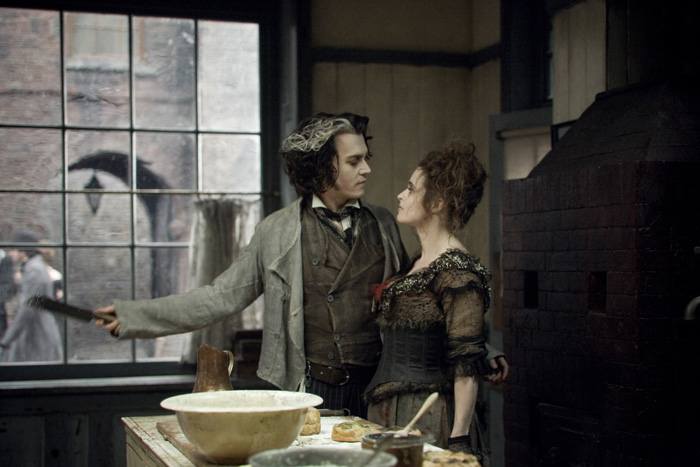
In many ways, one of the most daring films Tim Burton ever made, Sweeney Todd is a grim movie musical based on the classical stage work by Stephen Sondheim.
Johnny Depp plays, and sings, the titular role of a crazed barber who returns to London secretly after a long exile to exact revenge on a crooked judge, played by Alan Rickman, who he blames for the death of his wife. He moves in with his old landlady, Mrs. Lovett (Helena Bonham Carter), but an old acquaintance recognizes him and he must kill him to protect his identity.
Todd then sets down a dangerous path of killing his customers at random, and Mrs. Lovett, who sells meat pies, must find a creative way to dispose of the bodies.
Pulling off a successful movie musical is no easy feat, and when the subject matter is as gruesome as Sweeney Todd’s an audience that enjoys both genres is hard to come by. Other challenges with the format involve incorporating choruses and numbers meant to be on a stage into a setting that would be more typical and real in a film.
Not only does Burton manage to succeed in these tasks splendidly, but somehow he also retained his signature style. While part of the movie’s brilliance can be attributed to the source material, which Burton, atypically, followed quite closely, the terrific performances and strong vision of the director are similarly responsible.
5. Big Fish (2003)
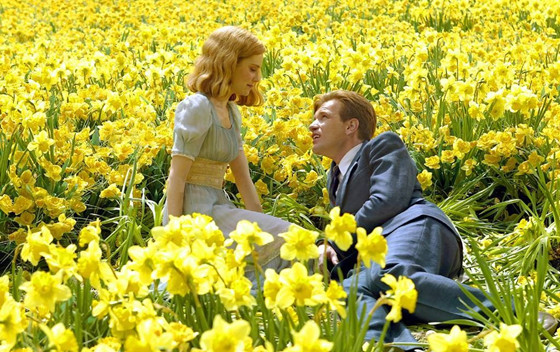
One of Burton’s most personal projects, this odd fairy tale focuses on Edward Bloom, an old man who connects with his son on his deathbed by telling him amazing, and highly improbable, tall tales about his life. The audience sees these tales told in scattered vignettes with Ewan McGregor playing the young Bloom
. Some major plot points in his life include him joining a circus, fighting in the Korean War, and robbing a bank. Of course, more notable are the interesting characters that inhabit these journeys, including giants, siamese twins and even werewolves.
Based on the novel by David Wallace, this cult classic is a great fit for Burton’s oddball sense of style, but in a way that nobody predicted. Gone are the gaunt and dark environments, being replaced instead by the charm of middle America.
Perhaps the cause of this stylistic anomaly is because of the strong connection that Burton felt to the powerful father-son thematic content of the story, himself losing his father a few years prior. BIg Fish is a highly unique film that gives us an insight into a different kind of diretor that Burton could be if he so chose, and although many didn’t know what to think of the film initially, it has grown into one of the filmmaker’s most beloved.
4. Batman (1989)

After the breakthrough success of Beetlejuice, Burton was handed his first blockbuster opportunity, helming the first modern film adaptation of the monster comic book franchise. Initially, fans of the comic were appalled, looking at Burton’s past films like Pee Wee as too campy for Batman, and the casting of comic actor Michael Keaton in the lead role didn’t help things. Thankfully, they were very wrong and Burton’s Batman stands today as one of the darkest and most “comic book-y” entry to the franchise.
A crucial element of the film’s success was the incredible atmosphere of Gotham City, juxtaposing the gritty back alleys with the rich mansions and towers. Jack Nicholson’s performance as the joker, while perhaps not as genius as Heath Ledger’s in The Dark Knight, remains a pleasure to watch, taking a very different, but similarly disturbing interpretation of the character.
Another important element to Batman that is often overlooked is Danny Elfman’s brilliant soundtrack, which has since inspired numerous copycats. Although the origins of the Joker are a new invention in this movie, Burton was heavily influenced by the classic Batman graphic novels The Killing Joke and The Dark Knight Returns, in many ways capturing a truer depiction of the classic hero and his environment than even the highly touted Christopher Nolan trilogy.
3. Ed Wood (1994)
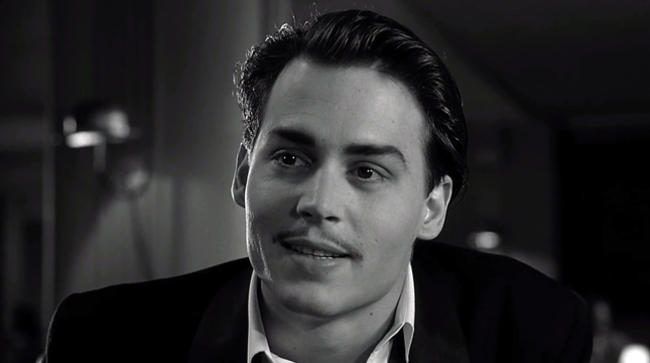
At once one of Burton’s most highly acclaimed and least financially successful films, Ed Wood is a fascinating look at one of cinema’s most bizarre personalities. Johnny Depp, in one of his most brilliant roles, stars as the titular Wood, an aspiring director in the 1950s film industry with more than a few quirks, making it hard for his films to get produced.
For one, he was an open transvestite and made it the topic of his first film Glen or Glenda. In addition to bizarre subject matter, Wood was an awful director, only shooting one take of every shot and lacking any sense of craft. His masterpiece Plan 9 From Outer Space is the definition of a “so-bad-its-good” movie.
The plot of the film follows Wood through his struggles to fund his projects, having to go to great and desperate lengths to find producers. For example, he dug out his idol Bela Lugosi, played by Martin Landau in an Oscar winning turn, from his drug addicted retirement in order to convince financiers of success. Other times he had to cast donors children in leading roles.
It is these types of extraordinary sacrifices Wood made for his horrible films that make the person so interesting. The film is much more grounded than most of Burton’s in that it has no supernatural or grisly events, but the bizarre reality of the story makes it just as captivating.
2. Beetlejuice (1988)
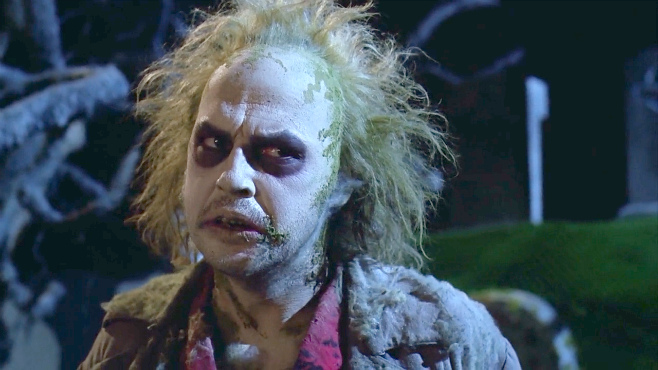
Burton was handed many scripts after the success of his debut Pee Wee, but declined many because they weren’t as inventive or creative for his talents. Finally this story came across his desk which he thought had enough merit.
Winona Ryder plays Lydia, a goth teen whose family moves into a new house only to find it is haunted by a young couple. The couple wish to remove the humans from the house so they hire a ghastly “bio-exorcist” named Beetlejuice, played by Michael Keaton. At first Beetlejuice helps them but soon they regret the decision as he goes off the rails, trying to take over the house for himself.
Beetlejuice is a perfect blend of goofy comedy and bizarre horror. The wacky antics and Keaton’s sublime performance provide the comedy and the grotesque B-Movie grade special effects provide the atmosphere. Compared to Pee Wee, Beetlejuice displayed much more concentrated vision from Burton and proved Hollywood that not only was he a talented filmmaker, but also that people would go to see his films.
1. Edward Scissorhands (1990)
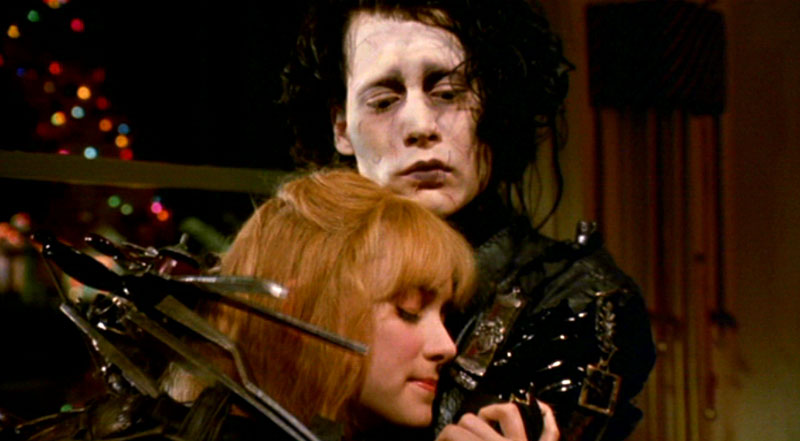
Edward Scissorhands is the perfect fruition of all of Burton’s directorial skills and styles. The art direction is nothing short of brilliant, juxtaposing the pastel colors of the suburban neighborhood where the film is set with the dark, gothic design of the main character.
Johnny Depp stars in his first of many collaborations with Burton as Edward, an artificial human made by an inventor (Vincent Price) who has sharp scissor blades for hands. He is found by an unassuming suburban housewife who brings the scared Edward to live with her family. There he befriends the neighbors with his innocent nature and skills with trimming topiaries and eventually hair.
He makes an especially strong friendship with the family’s daughter Kim, played by Winona Ryder, much to the opposition of Kim’s boyfriend who plots to turn the town against Edward out of jealousy. Much of the charm of the film comes from Depp’s silent performance, emulating Charlie Chaplin in order to effectively convey emotion without words.
Straight from “21 Jump Street,” Depp proved that he had more to offer than just being attractive, and the legendary actor-director team was born. Built on a heartwarming plot, packed with dazzling visuals and an acclaimed score by Danny Elfman, Edward Scissorhands is Burton’s undisputed masterpiece and a must see for every movie fan.
Author Bio: Matthew Benbenek is an undergraduate Mechanical Engineering student at the University of Wisconsin – Madison. He has a passion for film, music and literature and, when not watching movies, is an amateur director and violin player.